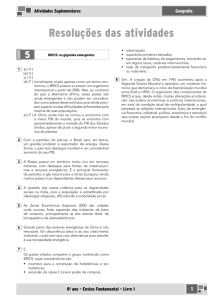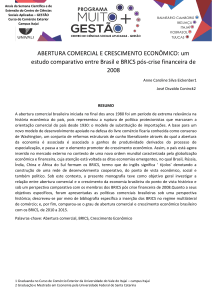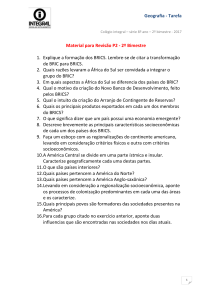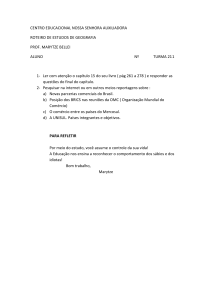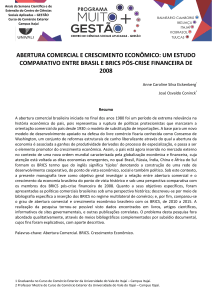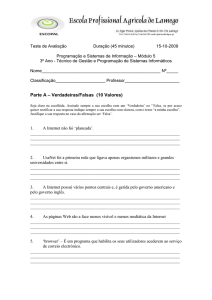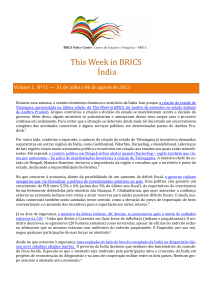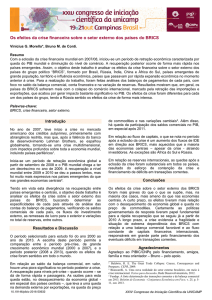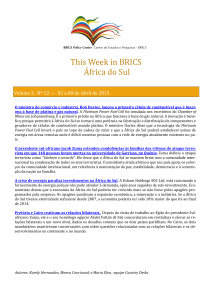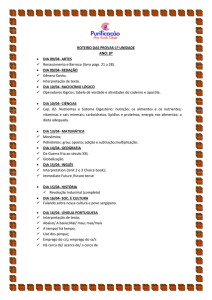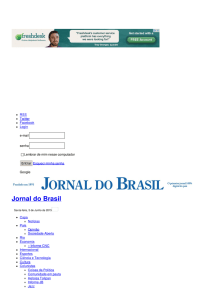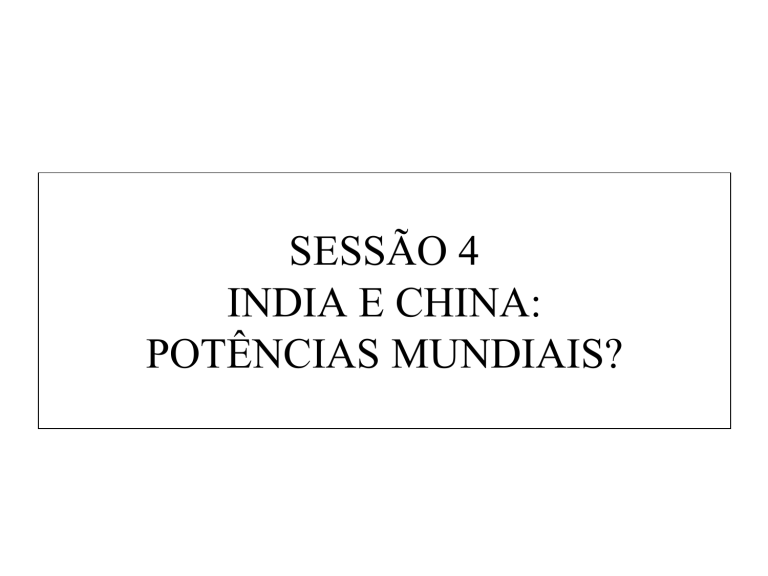
SESSÃO 4
INDIA E CHINA:
POTÊNCIAS MUNDIAIS?
SUMÁRIO
Países Emergentes e BRICs: Conceitos idênticos?
BRICS: Semelhanças e diferenças
A Ásia como Desafio e como Oportunidade
Índia: Castas e pobreza no país do software
China: Democratização versus crescimento?
Gigantes empresariais
Desafios para Portugal e a Europa
Países Emergentes e BRICS:
Conceitos idênticos?
Países Emergentes: Um conceito vago e pouco preciso
Novos países de economia de mercado?
Países em crescimento rápido?
BRICS: Brasil, Russia, India, China & South Africa
Será possível (e conveniente) estabelecer uma correspondência
entre os dois conceitos?
BRICS.
Semelhanças e Diferenças
As Semelhanças: Dimensão, Relevância Regional/ Continental,
Potencial de crescimento...
As Diferenças: Dimensão, Características Geo-demográficas,
Características políticas, Inserção na economia de mercado,
Dinâmica e Potencial de crescimento regional e nacional...
As Diferenças são muito mais significativas que as Semelhanças
A Ásia como Desafio e como
Oportunidade
Os Desafios: Dimensão e Dinâmica populacional, Ética de
trabalho, Empenhamento em aprender, Dinâmica económica,
Ambição nacional (especialmente no caso da China), Economias
de aglomeração e inter-acções, Redes internacionais e regionais,
Operações de aquisição...
As Oportunidades: Dimensão e potencial de crescimento
dos mercados (Being where the action is), Integração de novos
estratos populacionais, Exploração de EspecializaçõesRecíprocas,
Envolvimento global...
Fonte: UNCTAD, WIR (2005)
Fonte: UNCTAD, WIR (2005)
INDIA
Castas e Pobreza no País do
Software
INDIA
Elementos retirados de Wilsdon &
Keeley (2007)
The Atlas of Ideas, Demos
Table 1– Key scientific and social indicators
Table 1– Key scientific and social indicators (cont.)
Table 1– Key scientific and social indicators (cont.)
CHINA
Democratização versus Crescimento?
CHINA
Elementos retirados de Wilsdon &
Keeley (2007)
The Atlas of Ideas, Demos
Table 4 – Headlines Statistics
Table 4 – Headlines Statistics (cont.)
Table 4 – Headlines Statistics (cont.)
5 TIPOS PRINCIPAIS DE
COLABORAÇÃO
• Multilateral programmes and projects
• Multinational corporate R&D
• Bilateral programmes or centres
• Bottom-up networking and joint research
• Research fellowships and travel scholarships
Gigantes Empresariais
CHINA
INDIA
Lenovo
Shanghai Auto
China Const. Bank
Tata
Ranbaxy
Wipro
Desafios para Portugal e a
Europa
Fonte: Simões (2007)
The Future (I)
The Global Environment
The World economic landscape is changing
Different Dynamics and Growth rates: East versus West;
Pacific versus Atlantic
Companies are moving towards the places ‘where action is’
Educated and Committed Workforce supply makes a difference
The Future (II)
A Greying Europe
Europe is really ‘at Fifty’: Getting old without wisdom?
‘En quête du temps perdu’: Failing to recognise that the
World has changed, and is changing fast
Nice words... but lack of coordinated action
‘Enlargment hopes’ not turned into reality: not enough new
blood
Is an Europe of services sustainable?
The Future (III)
A ‘slowing’ Portugal
Correct policies...but too slow a pace for recovering
An economy very vulnerable to external shocks
Lack of consistent FDI strategy: what is the country aiming at?
Overcoming the ‘dual perspective’
Fostering dynamic linkages
The need to build on existing strengths: adaptability, creativity
and ‘bridging’
Can outward investment play a role?
Learning from the success stories
The Future (IV)
Understanding the new challenges and avoiding complacency
Promoting European ‘anchoring’ with a global vision
Attracting new blood with new ambition
Creativity and relational capabilities as assets for Europe in an
Eastern-bound 21st. century

